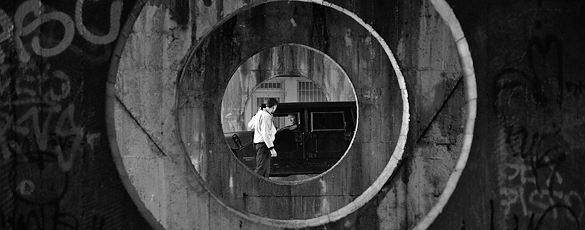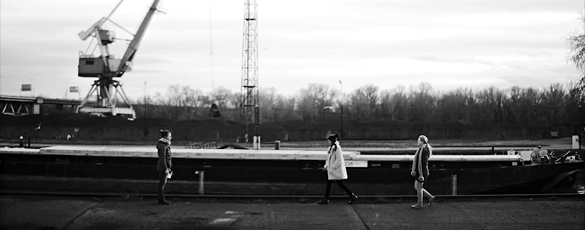Začiatok stránky, titulka:
Pokračovanie obsahu:
In the Sign of Dynamics
Last year brought not only a genre variability into Slovak cinema but also several successes at festivals and for some films also a place in foreign cinema distribution. The current year promises titles that could well continue in this trend.

A film drama inspired by the much-praised book by Monika Kompaníková Little Harbour (Piata loď) will be presented at the prestigious Berlin International Film Festival. In this film, director Iveta Grófová focuses on the world of children which, in many aspects, is far from carefree. Little Jarka – the main hero of Little Harbour – has problems mainly arising from the unstable and emotionally cold family background, which is why she “plays” mother herself when she abducts two babies under strange circumstances and decides to take care of them in a garden cottage. Grófová’s film will have its Slovak distribution première in March.
In the same month, the biography A Prominent Patient (Masaryk) will be presented to audiences; it also has been allocated a place in the Berlin Film Festival programme. The Slovak-Czech co-production directed by Julius Ševčík takes note of the fates of the official, diplomat and Bohemian Jan Masaryk whose death remains shrouded in mystery. A brilliant orator and bon-vivant, he also had his dark side and his escape from responsibility, his colleagues and himself also gets into the story. Karel Roden, a Czech actor with international experience, plays the title role.
The much anticipated genre films include the thriller Kidnapping (Únos) directed by Mariana Čengel Solčanská which is set in the wild 1990s just like The Red Captain (Červený kapitán, dir. Michal Kollár). Kidnapping revolves around crimes in which the state and its branches of power played a significant role. The protagonists of the story become entangled in a net of events which in some cases result in destroyed lives. The film with the tagline “To learn the truth always means to forfeit illusions” talks about the political morass of the first years of Slovakia’s independence and it will be distributed in cinemas at the beginning of March.
The full-length documentary A Hole in the Head (Diera v hlave) by renowned director Robert Kirchhoff features the racial persecution of the Roma in Central Europe during World War II. The essayistic fresco, made without using archive materials, was presented last year at the DOK Leipzig festival and at the Jihlava International Documentary Film Festival. This year it was also presented at the Trieste Film Festival and its distribution première is planned for the end of March.
The mid-length Hotel Sunrise (Hotel Úsvit) by young filmmaker Mária Rumanová is a success of Slovak documentary filmmaking; it received its première in November 2016 at the International Documentary Film Festival Amsterdam (IDFA). However, it would be misleading to refer to Hotel Sunrise as a pure documentary. In her film, Rumanová depicts the small town of Čierna nad Tisou in Eastern Slovakia. It used to be regarded as the golden gate of socialism, but today it is just a smuggling one-horse town on the Slovak-Ukrainian border. Four protagonists alternate in visually impressive shots – they strive to escape the endless round of peripheral stagnation and life experience that brings them down, equipped mainly with the yearning for a bit of happiness.
The full-length drama Filthy (Špina) by young director Tereza Nvotová dealing with the issue of growing up and rape, received its international première at the International Film Festival Rotterdam (Bright Future section) at the turn of January and February. It is the story of a sensitive girl who has to face up to her trauma, while the one who caused it wins the love of all her loved ones.

The new film by world-renowned filmmaker Agnieszka Holland Spoor (Pokot/Cez kosti mŕtvych) represents one of the most interesting co-productions. An atypical heroine – an elderly animal protector, Janina Duszejko, who lives alone in the Klodzko Valley, where a series of mysterious crimes are committed within a short time, takes the lead in this Polish-Czech-German-Slovak-Swedish drama based on Olga Tokarczuk’s novel. Janina is convinced that she knows the perpetrator, but no one believes her. Spoor will receive its première in the main competition of the Berlinale and it will be released in Slovak cinemas in April.
As for this year’s other premières, let us not omit the thriller by one of the most productive Slovak film and television directors, Peter Bebjak, The Line (Čiara). After last year’s presentations within the industry programmes of several festivals, his new film should be finished and released this year. The story is set on the Slovak-Ukrainian border where the daughter of the head of organised crime, Adam Krajňák, marries the local thief, Ivor. However, Adam has to deal with his Ukrainian partner Jona who is beginning to rebel and, moreover, a new type of goods appears on the border – narcotics.
This year also Nina should be released in cinemas – another view of the world of adults from a child’s perspective. Nina is eleven years old and the life she had known previously is falling apart. She does not understand her parents and their decisions, she feels lonely and deceived. Her only certainties are swimming and childhood dreams. The film was made by director Juraj Lehotský, who also made Blind Loves (Slepé lásky, 2008), a film successful at festivals which received several international awards.
As for Slovak minority co-productions, for instance, Ice Mother (Bába z ledu/Baba z ľadu) directed by Bohdan Sláma should be released, as well as the final project by Jan Němec – a significant Czech filmmaker, a representative of the Czechoslovak new wave of the 1960s, who passed away last year – The Wolf from Royal Vineyard Street (Vlk z Královských Vinohrad), Little Crusader (Křižáček/Križiačik) by Václav Kadrnka who attracted with his previous film Eighty Letters (Osmdesát dopisů, 2011) and Freedom (Freiheit/Sloboda) by German director Jan Speckenbach. Also two well-known Czech filmmakers have new films: Jan Svěrák will present the result of his further collaboration with his father Zdeněk Svěrák Barefoot on Stalks (Po strništi bos/Po strnisku bosý), and Jan Hřebejk, who made The Teacher (Učiteľka) in Slovakia last year, is preparing the film trilogy Garden Store (Zahradnictví/ Záhradníctvo) in a Slovak co-production.
All that is just a selection of the films planned for distribution; in reality, the 2017 cinema year in Slovakia should be even more lively and diverse.
Zuzana Sotáková
Kidnapping. PHOTO: JMB Fillm & TV Production, Filthy. PHOTO: BFILM